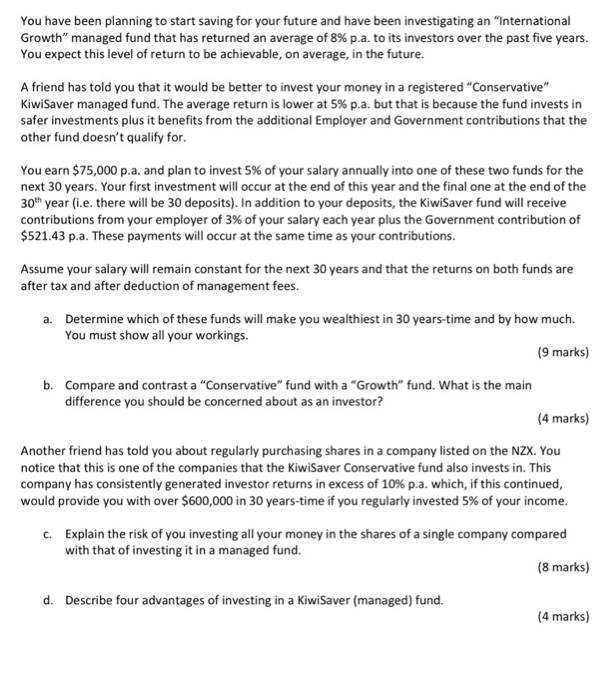This is one of my past paper and I dont know the answers.

You have been planning to start saving for your future and have been investigating an "International Growth" managed fund that has returned an average of 8% p.a. to its investors over the past five years. You expect this level of return to be achievable, on average, in the future. A friend has told you that it would be better to invest your money in a registered "Conservative" KiwiSaver managed fund. The average return is lower at 5% p.a. but that is because the fund invests in safer investments plus it benefits from the additional Employer and Government contributions that the other fund doesn't qualify for. You earn $75,000 p.a. and plan to invest 5% of your salary annually into one of these two funds for the next 30 years. Your first investment will occur at the end of this year and the final one at the end of the 30th year (i.e. there will be 30 deposits). In addition to your deposits, the KiwiSaver fund will receive contributions from your employer of 3% of your salary each year plus the Government contribution of $521.43 p.a. These payments will occur at the same time as your contributions. Assume your salary will remain constant for the next 30 years and that the returns on both funds are after tax and after deduction of management fees. a. Determine which of these funds will make you wealthiest in 30 years time and by how much. You must show all your workings. (9 marks) b. Compare and contrast a "Conservative" fund with a "Growth fund. What is the main difference you should be concerned about as an investor? (4 marks) Another friend has told you about regularly purchasing shares in a company listed on the NZX. You notice that this is one of the companies that the KiwiSaver Conservative fund also invests in. This company has consistently generated investor returns in excess of 10% p.a. which, if this continued, would provide you with over $600,000 in 30 years-time if you regularly invested 5% of your income. c. Explain the risk of you investing all your money in the shares of a single company compared with that of investing it in a managed fund. (8 marks) d. Describe four advantages of investing in a KiwiSaver (managed) fund. (4 marks)








